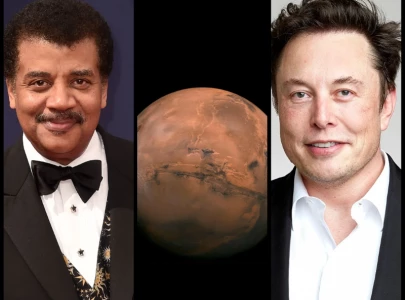

The longstanding debate over Mars colonization reignited as Elon Musk and astrophysicist Neil deGrasse Tyson exchanged pointed comments about the billionaire’s quest to establish a civilization on the Red Planet.
On Friday’s "Overtime" segment of *Real Time with Bill Maher*, Tyson criticised Musk’s ambitions, questioning whether the vision to establish life on Mars is financially feasible—or even worthwhile in the face of Earth's immediate issues.
During the conversation, host Bill Maher leaned into deGrasse Tyson’s long-standing position on prioritizing Earth’s needs over extraterrestrial goals. “How badly would we have to rat f**k Earth before it’s worse than a place that’s 200 below zero with no air and no water with six months to reach it?” Maher asked. Tyson enthusiastically agreed, exclaiming, “Preach it! Preach it!”
A History of disagreement
Musk and Tyson have frequently locked horns on this issue. Musk views the establishment of a Mars colony as critical for humanity’s long-term survival, arguing that it provides an insurance policy for the continuation of consciousness. Tyson, however, believes Earth’s problems should be addressed first, asserting that space exploration has typically only been feasible when driven by geopolitical motivations, such as the Cold War’s race to the Moon.
On Maher’s show, deGrasse Tyson elaborated on his skepticism, saying, “My read of the history of space exploration is such that we do big, expensive things only when it’s geopolitically expedient, such as when we feel threatened by an enemy.” He went on to paint a tongue-in-cheek scenario in which Musk pitches his Mars plan to venture capitalists. “What does that venture capitalist meeting look like?” Tyson quipped. “‘So, Elon, what do you want to do?’ ‘I want to go to Mars.’ ‘How much will it cost?’ ‘$1 trillion.’ ‘Is it safe?’ ‘No. People will probably die.’ ‘What’s the return on the investment?’ ‘Nothing.’ That’s a five-minute meeting. And it doesn’t happen.”
Tyson capped is criticism with a reminder about the financial reality of space projects: “At some point somebody has to pay for it, and just being interested in something is not the same thing as paying for it.”
Musk responds with a rebuke
On Saturday, Musk took to X (formerly Twitter) to respond. He dismissed Tyson’s arguments with an exasperated metaphorical slap of the forehead, writing, “Wow, they really don’t get it. Mars is critical to the long-term survival of consciousness. Also, I’m not going to ask any venture capitalists for money. I realize that it makes no sense as an investment. That’s why I’m gathering resources.”
Musk then turned his attention to what he implied were Tyson’s motives. He criticized Tyson for allegedly aligning with “woke” ideology to evade being “canceled,” referring to a previous controversy involving Tyson. “The real problem is that Neil decided to grovel to the woke far left when he got hit with a #MeToo. You can avoid being canceled if you beg for forgiveness and push their nonsense ideology. The truth hurts,” Musk wrote.
Musk continued to advocate for the Mars mission, claiming it could lead to advanced technologies beneficial even if the Mars colony were to fail. “Even if we fail at creating a Mars colony that can grow without continuous support from Earth, the absurdly ambitious nature of the goal nonetheless results in the creation of alien-level technology that is crushingly better than competitors who merely aim for Earth orbit.”
This latest clash marks another chapter in an ongoing debate that has fascinated scientists and the public alike, as questions around Earth’s future and humanity’s role in space exploration remain at the forefront of both scientific inquiry and cultural discourse.